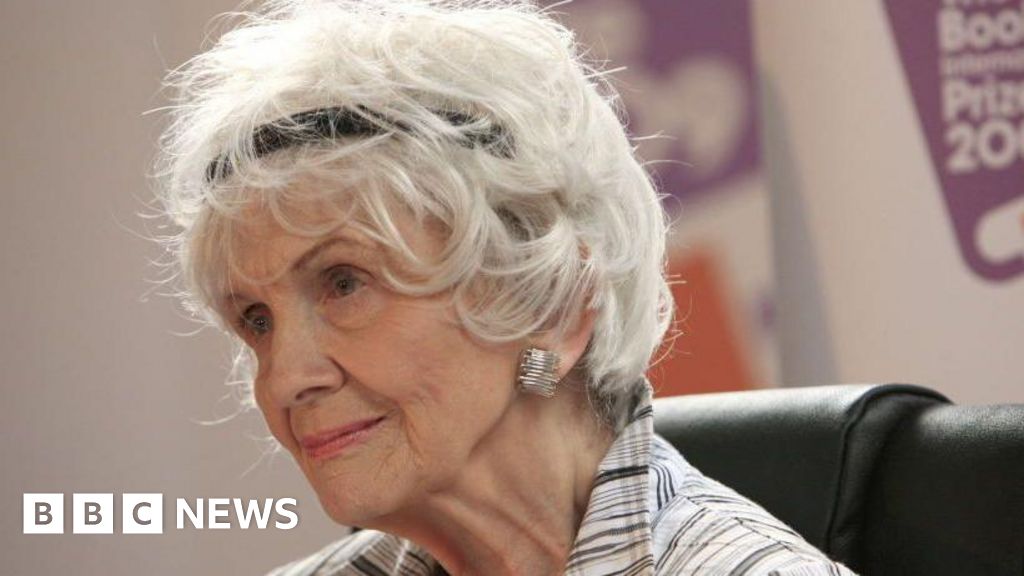


Image source, AFP via Getty Images
The youngest daughter of acclaimed Canadian Nobel laureate Alice Munro has said that her step-father sexually assaulted her as a child, and that her mother stayed with him even after learning of the abuse.
In an essay published in the Toronto Star on Sunday, Andrea Robin Skinner described how her step-father began assaulting her in the summer of 1976 when she was nine years old and he was in his 50s.
One evening, when Munro was away, he “climbed into the bed where I was sleeping and sexually assaulted me”, Ms Skinner said.
Munro, who learned of the abuse years later, remained with him until his death in 2013.
The author, who died in May at the age of 92, is one of the most celebrated short-story writers in Canadian history.
Her collections often focused on life in small-town Ontario where she was raised, earning praise for their nuanced portrayals of women and girls.
In the weekend essay, Ms Skinner and her siblings said they believed this dark family story must also be part of Munro’s legacy.
“I never wanted to see another interview, biography or event that didn’t wrestle with the reality of what had happened to me, and with the fact that my mother, confronted with the truth of what had happened, chose to stay with, and protect, my abuser,” she said.
In her piece, Ms Skinner said she was first assaulted during a summer visit to her mother and step-father, Gerald Fremlin, in their home in Clinton, Ontario.
She later told her step-mother, who then told her father, Jim Munro, who decided not to confront Alice Munro at the time.
Ms Skinner returned to her mother’s home the next year.
The step-mother, Carole Sabiston, is quoted by The Star in a separate news story as saying: “I told her she didn’t have to go. But she wanted to spend time with her mother.”
Ms Sabiston confirmed the events as described by Ms Skinner to the BBC.
Ms Skinner was initially relieved her father kept the family secret, she said, because of fears over how her mother would react.
“She had told me that Fremlin liked me better than her, and I thought she would blame me if she ever found out,” she wrote.
Over the next several years, during visits, the abuse continued.
Fremlin exposed himself to her during car rides, propositioned her for sex, and “told me about the little girls in the neighbourhood he liked”.
He lost interest when she became a teenager, Ms Skinner told The Star.
She said kept quiet about the abuse but in early adulthood found herself struggling at university and with her physical and mental health.
A few years later, in 1992, she revealed the abuse in a letter to her mother. She says Munro reacted as she had feared – “as if she had learned of an infidelity”.
“Andrea invaded my bedroom for sexual adventure,” Fremlin wrote.
“If the worst comes to worst I intend to go public. I will make available for publication a number of photographs, notably some taken at my cabin near Ottawa which are extremely eloquent … one of Andrea in my underwear shorts,” he said.
Amid the fallout, Alice Munro left Fremlin, staying at a flat she owned in British Columbia. But she returned to her husband after a few months and stayed with him for the rest of his life.
She said “that our misogynistic culture was to blame if I expected her to deny her own needs, sacrifice for her children, and make up for the failings of men”, Ms Skinner wrote.
In 2005, Ms Skinner reported the abuse to Ontario police, presenting the letters written by Fremlin.
Police charged him with indecent assault. He pleaded guilty, but “the silence continued”, Ms Skinner wrote, because of Munro’s fame.
In a statement, Munro Books, founded by Alice and Jim Munro and now independently owned, said that it “unequivocally supports” Ms Skinner’s decision to tell her story publicly.
In a separate statement released by the Canadian bookstore, the Munro siblings said that the store’s decision to acknowledge “Andrea’s truth, and being very clear about their wish to end the legacy of silence, the current store owners have become part of our family’s healing”.